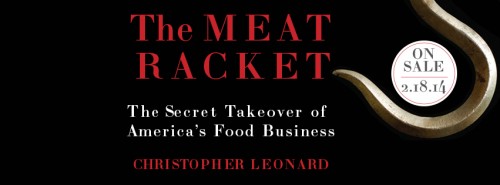In The Meat Racket, investigative reporter Christopher Leonard takes on the astonishing consolidation of the US meat industry in recent decades–and delivers a damning account of how just a few companies have built a system that has turned American farmers into sharecroppers and devastated rural communities, while raising consumer prices for meat and walking away with the tremendous profits. The power that just a few companies wield over our food system is one of the most important and least-discussed obstacles to building a healthy and just food system for all, and we’re thrilled that this new book will shed some light on this critical issue.
 We had the opportunity to meet Chris recently, and he was kind enough to answer our three questions about The Meat Racket, the food system, and why antihunger advocates should pay attention.
We had the opportunity to meet Chris recently, and he was kind enough to answer our three questions about The Meat Racket, the food system, and why antihunger advocates should pay attention.
What inspired you to write the book?
This book started for me in 2004, when I was working as a newspaper reporter and traveled to the town of Waldron, Arkansas to write a story about chicken farmers there. I was horrified by what I saw. The farmers were under contract to grow birds for Tyson Foods, and many of them lived like indentured servants. Tyson seemed to have total power over them. Farmers were scared to talk to reporters, even scared to talk to their neighbors in some cases. It seemed like they were living in a feudal system, not a capitalist system. I wanted to learn a lot more about how this system came to be, and how it really operates. And that led me down the road to writing about the entire meat industry, and how a few companies managed to take it over.
What do you hope is its impact on how our food is produced?
I would be thrilled if this book just raised awareness of how the meat industry works. The companies in the book don’t get the media scrutiny they deserve, partly because they are located in such remote, rural communities. It took years of reporting to map out how these companies really operate, and I want the evidence I uncovered to reach as many readers as possible.
Ultimately, I would like our food system to be defined more by transparent and competitive markets than by opaque contract systems.
If I care about ending hunger and increasing access to nutritious food, why should I care about the issues in The Meat Racket?
I think you should care a lot because meat is still an important source of protein for a lot of families who are struggling to pay for food. I would wager than anyone who works with hungry families hears this same refrain: meat is getting much more expensive. Families are cutting back on meat consumption because the prices are so high. That can be a good thing in affluent households that eat too much meat, but it can be a real sacrifice for many families that are just trying to get by. One key reason that meat prices are rising is because the companies that make it have gotten so big. The book shows clearly how companies like Tyson Foods can cut production to raise meat prices, and how it has done so repeatedly in recent years.
Bonus policy question: We finally have a new farm bill. It contains a few good elements and it’s not as bad as it could have been, but it cuts almost $9 billion from food stamps and enhances its support of agribusiness. Do you think it’s possible that the next farm bill cycle (or the one after that) could produce a bill that doesn’t support Big Food/Ag on the backs of poor Americans?
Big agribusiness firms are remarkably good at lobbying. They seem to win nine out of ten rounds. I think it is possible that this balance of power could change, because we have seen such changes in our country before (the recent book The Bully Pulpit, by Doris Kearns Goodwin, recalls such a moment in history). Do I think it’s likely? I don’t think so. But I would really like to be proven wrong.
Pick up The Meat Racket today at your local bookstore, and learn more at www.themeatracket.com and on Facebook.


